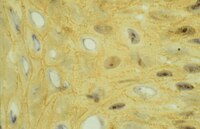Tumor cell targeted gene delivery by adenovirus 5 vectors carrying knobless fibers with antibody-binding domains.
Henning, P; Andersson, KM; Frykholm, K; Ali, A; Magnusson, MK; Nygren, PA; Granio, O; Hong, SS; Boulanger, P; Lindholm, L
Gene therapy
12
211-24
2004
Show Abstract
Most human carcinoma cell lines lack the high-affinity receptors for adenovirus serotype 5 (Ad5) at their surface and are nonpermissive to Ad5. We therefore tested the efficiency of retargeting Ad5 to alternative cellular receptors via immunoglobulin (Ig)-binding domains inserted at the extremity of short-shafted, knobless fibers. The two recombinant Ad5's constructed, Ad5/R7-Z(wt)-Z(wt) and Ad5/R7-C2-C2, carried tandem Ig-binding domains from Staphylococcal protein A (abbreviated Z(wt)) and from Streptococcal protein G (C2), respectively. Both viruses bound their specific Ig isotypes with the expected affinity. They transduced human carcinoma cells independently of the CAR pathway, via cell surface receptors targeted by specific monoclonal antibodies, that is, EGF-R on A549, HT29 and SW1116, HER-2/neu on SK-OV-3 and SK-BR-3, CA242 (epitope recognized by the monoclonal antibody C242) antigen on HT29 and SW1116, and PSMA (prostate-specific membrane antigen) expressed on HEK-293 cells, respectively. However, Colo201 and Colo205 cells were neither transduced by targeting CA242 or EGF-R nor were LNCaP cells transduced by targeting PSMA. Our results suggested that one given surface receptor could mediate transduction of certain cells but not others, indicating that factors and steps other than cell surface expression and virus-receptor interaction are additional determinants of Ad5-mediated transduction of tumor cells. Using penton base RGD mutants, we found that one of these limiting steps was virus endocytosis. | 15510176
 |
The osteoclast functional antigen, implicated in the regulation of bone resorption, is biochemically related to the vitronectin receptor.
Davies, J, et al.
J. Cell Biol., 109: 1817-26 (1989)
1988
Show Abstract
We have defined the structure of the Osteoclast Functional Antigen (OFA) by immunological and biochemical means. OFA is an abundant surface antigen in human and animal osteoclasts and has been characterized previously by monoclonal antibodies 13C2 and 23C6, one of which mimicks the inhibitory activity of calcitonin on osteoclastic bone resorption. By the following criteria we show that OFA is a member of the integrin family of extracellular matrix receptors and is identical, or at least highly related, to the vitronectin receptor (VNR) previously isolated from placenta and melanoma cells. Immunoprecipitation analysis demonstrates that OFA from osteoclasts and a monkey kidney cell line Vero is a heterodimeric molecule of 140 kD (alpha chain) and 85 kD (beta chain) under nonreducing conditions; on reduction at least one low molecular mass (alpha') species (of approximately 30-kD size) is released, resulting in a 120/100-kD dimer. Immunoblots of OFA isolated from osteoclasts and Vero cells and VNR purified from placenta and probed with heterosera to OFA and monoclonal antibodies to platelet gp111a (VNR beta chain) show immunological cross-reactivity between the alpha chains of OFA and VNR and the use of gp111a as a beta chain by both. OFA from Vero cells binds to an Arg-Gly-Asp containing peptide (GRGDSPPK) isolating a heterodimer recognized by anti-OFA monoclonal antibodies, 13C2 and 23C6. Immunohistochemical analysis showed a similar tissue distribution in humans for the antigen recognized by anti-OFA antibodies, a monoclonal antibody, LM142, raised to melanoma VNR, polyclonal antibodies to the placental VNR and a monoclonal antibody to the presumptive VNR beta chain, platelet glycoprotein 111a. Finally, NH2 terminal amino acid sequencing showed that the amino-terminus of the monkey alpha chain was identical in the 12 assigned residues to that of human VNR alpha chain. The beta chain sequence of OFA differed at least 1 (and up to 4) positions from platelet gp111a (VNR beta) in the first 18 amino acids sequenced. These, and other, data provide the first indication of a function for the VNR and suggest that cell-cell and cell-extracellular matrix interactions involving integrins may play an important role in bone physiology. | 2477382
 |
Monoclonal antibodies to osteoclastomas (giant cell bone tumors): definition of osteoclast-specific cellular antigens.
Horton, M A, et al.
Cancer Res., 45: 5663-9 (1985)
1985
Show Abstract
The cellular origin of the osteoclast, the major agent of bone resorption, remains controversial despite the demonstration that osteoclasts form by fusion of mononuclear cells that are ultimately derived from a bone marrow stem cell. One view is that they are the terminally differentiated progeny of mononuclear phagocytic cells. However, we have previously provided evidence, from functional and phenotypic studies of rodent and human osteoclasts, that raises the possibility that osteoclasts form a separate cell lineage from conventional hemopoietic cells and macrophages in particular. In an attempt to elucidate this question, we have used monoclonal antibody techniques to examine the relationship between osteoclasts and other bone marrow-derived cells. By using osteoclasts from osteoclastomas (giant cell tumors of bone) for immunizations, we have produced 11 mouse hybridomas secreting monoclonal antibodies reacting with osteoclasts in normal human fetal bone and a variety of neoplastic and non-neoplastic bone lesions. Eight antibodies in 4 reactivity sets have been shown to recognize membrane antigens, whereas a further 3 react with cytoplasmic determinants. In 7 there is no cross-reactivity with macrophages in a wide range of tissues, thus effectively differentiating between these two cell types. These antibodies will prove useful for the identification of osteoclasts in tissues and in the separation of their circulating precursors, thus allowing an experimental approach to be made to many of the outstanding questions regarding the developmental pathobiology of the osteoclast. | 4053038
 |










